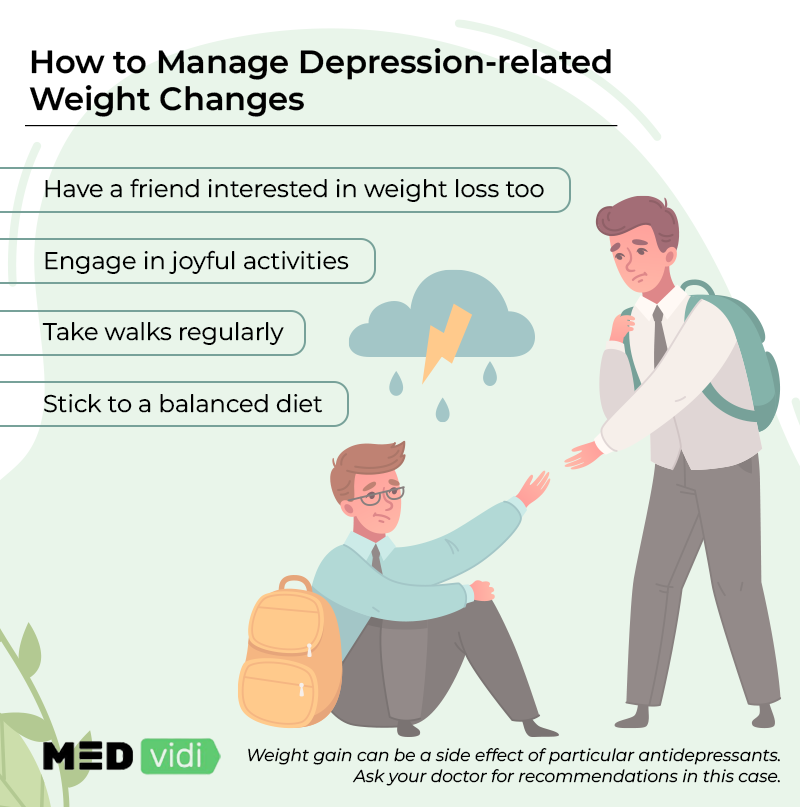Depression: Weight Loss vs. Weight Gain
Food and mood are frequently linked. It’s typical for challenging emotions to cause you to eat excessively or insufficiently. On the other hand, stress and apathy may result in reduced appetite. Such dietary changes can have long-term effects and cause significant weight gain or loss if you have severe depression.
Loss of interest in activities and lacking joy from them is also one of the traditional signs of depression. Anhedonia is the medical term for this condition. Scientists say it is rooted in the brain’s reward system and can make once-exciting activities suddenly seem monotonous. You may wonder, how is it related to your increased or decreased interest in food? For instance, your mouth picks up flavors like sweetness. But your brain interprets the pleasure you experience when eating. If your reward system malfunctions, you can eat more sweet foods to compensate for the lack of pleasure. Similarly, you can eat less if you no longer feel pleasure in eating.
Does Depression Cause Weight Gain?
Both weight gain and weight loss are potential signs of depression. Still, if talking about the link between obesity and depression, their connection exists. While being overweight can harm one’s emotional health, it’s also true that having a mental health condition can affect one’s weight.
According to a study, women who experience depression tend to
Do Antidepressants Cause Weight Gain?
Weight gain is a common adverse effect of several prescription antidepressants. However, it still depends on the particular person. When taking the same medication of the same dosage, some people will gain weight while others won’t.
Some
- A few tricyclic antidepressants, including amitriptyline (Elavil) and nortriptyline (Pamelor).
- Specific monoamine oxidase inhibitors (MAOIs), like phenelzine (Nardil).
- Selective serotonin reuptake inhibitor paroxetine (Paxil, Pexeva), citalopram (Celexa), and fluoxetine (Prozac).
- Atypical antidepressant mirtazapine (Remeron), a medicine that doesn’t cleanly fit into another antidepressant group.
Get antidepressants online with insurance. Make an appointment by clicking the button below.
Depression and Eating Disorders
The two major eating disorders most frequently linked to depression are bulimia nervosa and binge-eating disorder, characterized by binge eating—compulsive overeating used as a coping mechanism for unwelcome emotions and binging followed by purging (bulimia nervosa).
The

Managing Depression-Related Weight Fluctuations
Being overweight or underweight is nothing to be embarrassed about. With the resources you have, you’re doing your best. It’s okay if you want to maintain your weight for personal reasons other than succumbing to external pressure. The following tips can help you manage your weight while dealing with depression.
- Make friends with those who have the same goals
Having a weight-management partner can be beneficial. For example, the expert advises that you and a friend texting each other after engaging in some form of physical activity each day can help you keep on track.
- Find things you enjoy
It could be beneficial to increase the variety of activities you enjoy if you are someone who frequently eats comfort foods to manage depressive symptoms. Enjoying yourself is crucial no matter how concerned you are about your weight. Instead of eating when you are not hungry, try relaxing activities like taking a hot bath, sitting outside in nature, listening to music, or working on a craft or hobby.
- Taking a gentle walk
Regular walking may improve your mood and help you lose weight. Additionally, walking promotes better sleep, which enhances mood the following morning. Your body releases hormones that improve your emotional state when you walk and engage in other forms of exercise.
- Healthy diet
A healthy diet that has a reduced amount of highly processed meals and includes lots of fruits and vegetables can help ease the symptoms of depression. Also, a healthier diet will help you become more energetic, which may contribute to losing weight.
To overcome your challenges with depression and other related diseases, seek help right now.
To Sum Up
There is no one secret nutrient or eating strategy that could guarantee to cure depression. People with different body types suffer from this mental disorder, so only a comprehensive approach can help overcome it.
The link between depression and weight gain still requires more research, but having good overall nutrition can contribute to improving your mental health anyway. Your brain needs various proper nutrients, including vitamins, minerals, complex carbs, protein, and fatty acids. For the best results in treating depression and related illnesses, consider seeing a mental health professional. Our experts at MEDvidi are ready to assess your symptoms and develop a personalized treatment plan.










